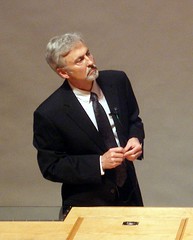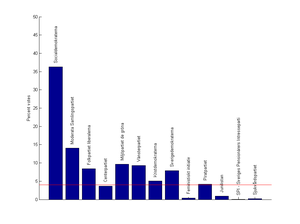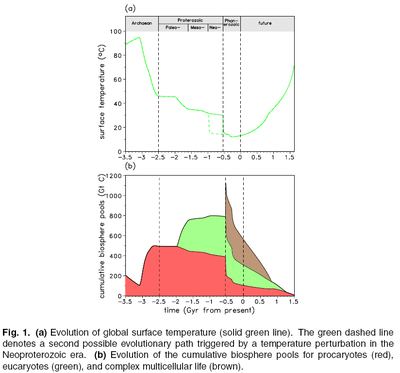May 28, 2009
Cheers for more color in Mammalia!
 Practical Ethics: Shining monkey, sadistic conclusion? - today I blogged about the transgenic monkeys with germline heritable fluorescence, or rather, whether it is OK to create research animals with disease genes. This can (if one is a utilitarian) tie in with some of the conundrum's of population ethics.
Practical Ethics: Shining monkey, sadistic conclusion? - today I blogged about the transgenic monkeys with germline heritable fluorescence, or rather, whether it is OK to create research animals with disease genes. This can (if one is a utilitarian) tie in with some of the conundrum's of population ethics.
I think we need more colourful mammals. I'm sure we can steal the genes producing gorgeous lizard pteridines and carotenoids. The real challenge is to get the intense colours or iridescence from nanostructures we see in birds.
Happy hour gene
 I think this paper presents one of the funniest names for a Drosophila mutant: Ammon B. Corl et al, Happyhour, a Ste20 Family Kinase, Implicates EGFR Signaling in Ethanol-Induced Behaviors, Cell 137, 949–960, May 29, 200
I think this paper presents one of the funniest names for a Drosophila mutant: Ammon B. Corl et al, Happyhour, a Ste20 Family Kinase, Implicates EGFR Signaling in Ethanol-Induced Behaviors, Cell 137, 949–960, May 29, 200
The happyhour mutants were not as sedated by alcohol as their wild-type relatives. If the receptor involved were inhibited by erlotinib, flies and mice instead became more sensitive. Rats with this treatment didn't drink as much alcohol. Lots of intriguing applications.
May 23, 2009
Is the biosphere unsustainable?
 Peter Ward's The Medea Hypotehsis is interesting, disturbing and a bit annoying. Most of all, it is an antidote to naive Gaianism. Ward argues that the Earth's biosphere is not a self-regulating, self-improving or self-preserving Gaia but something more sinister: a system prone to crashes, declines and a lifespan shortened by its own activity.
Peter Ward's The Medea Hypotehsis is interesting, disturbing and a bit annoying. Most of all, it is an antidote to naive Gaianism. Ward argues that the Earth's biosphere is not a self-regulating, self-improving or self-preserving Gaia but something more sinister: a system prone to crashes, declines and a lifespan shortened by its own activity.
The core idea is to check whether the claims of the various Gaia hypotheses hold up. He points out that many mass-extinctions appear to be biogenic: they are the fault of biological processes rather than meteors. He finds that there is no evidence for increasing diversity over time; recent data suggests it has been constant for a long time, and may have been higher in the pre-animal era. The total biomass of Earth may have peaked between a billion and 300 million years ago and have been declining ever since. Carbon dioxide levels have been declining due to increased weathering due to vascular plants, and will in the long run become so low that there is good reasons to think plants will go extinct, in turn leading to the loss of an oxygen atmosphere, oceans and life (long before the end of continental drift or increasing solar luminosity becomes a problem). The biosphere is unsustainable.
His conclusion is that we humans have a responsibility to set things right. The green thing to do is not to turn back to a preindustrial state and let nature take its course. First, it is unlikely to work, second, drastic means may be necessary to even limit the current greenhouse damage, and third, we are so far the only species able to prevent the long-term disasters the biosphere may be blundering into. If we have to use nuclear power, geoengineering, dam up the Greenland inland seas or whatever, so be it. If we really want to ensure that the biosphere thrives we will have to intervene on an enormous scale over long, perhaps indefinite, timescales.
Ward's case against Gaia appears relatively convincing. There doesn't seem to be any selection mechanism for negative feedbacks on the biosphere level. We know that species often evolve down cul-de-sacs (e.g. predators overspecializing and then getting wiped out by fluctuations), so it would be strange that the next level would be immune to it. As Ward points out, evolution favors species that set up positive feedback loops in their favor, no matter what the eventual outcome is, so evolution would tend to wreck Gaia. The individual examples of non-Gaia events or trends may be more problematic: much is based on new data, theories and models and hence likely to be changed. But he probably has enough examples to reliably refute most Gaia hypotheses - it is somewhat mysterious to me why people are so eager to believe suspiciously strong Gaia models (even leaving aside any New Age connotations).
The book could have done with better editing; it often repeats itself. In many ways it could have been shorter, except that the publishers no doubt wanted a "real" book.
It is a good introduction to the big geodynamic feedbacks regulating the planet, and it might make great reading for someone wanting to invent their own world for roleplaying or fiction. The sinister Canfield oceans are simply too good to pass up. I found S. Franck's future biosphere models quite fascinating; this is how to make a realistic "Dying Earth".
This is a Big Picture book. To Ward a hundred million years is a short time, and we really should be concerned about the next eon. Yet his proposals for action betray a relatively limited thinking: he is assuming that the next millennium will be inhabited by recognizable humans having roughly comparable needs to us. For example, he argues against space colonization based on the problems of sending humans around great distances and timespans. While this works as a kind of minimal hypothesis, I think he underestimates just how quick and weird humans are. Just a *mild* form of posthumans, say brain emulations, can change the ecological rules of mankind totally in what I estimate less than a century. While doing earth systems engineering might sound very radical today it is merely an extrapolation of our current (often inadvertent) activities. Doing a similar extrapolation of our other capabilities would suggest that within both geologically and climatologically short timescales we could both change ourselves and the rules of the biosphere radically. We still need to start now and we still need the change in perspective in ecological thinking Ward discusses. In a way he is suggesting trans-ecology (to ecology as transhumanism is to humanism), and I'm suggesting we might move into a post-ecology.
Selecting Supersoldiers
 I'm quoted in Harnessing science to create the ultimate warrior - New Scientist. The article is about an interesting new report, "Opportunities in Neuroscience for Future Army Applications" from the US National Academies of Science (NAS). Lots of neuroethically relevant stuff there.
I'm quoted in Harnessing science to create the ultimate warrior - New Scientist. The article is about an interesting new report, "Opportunities in Neuroscience for Future Army Applications" from the US National Academies of Science (NAS). Lots of neuroethically relevant stuff there.
One pernicious cliché is people born and bred to be perfect soldiers. This presupposes a level of long-term planning that is unlikely to be workable for any modern military force. In the far past war might have been unchanging enough that one could reasonably run a Spartan upbringing and expect the children to grow up to be suitable soldiers (ignoring the failures, of course). But today the military and political situation is changing much more rapidly. It is possible that most soldiers of the future might spend their time running drones in shirtsleeves at home. Or they might be managers, directing dozens of more or less intelligent AI devices. Or they will be out in the field like now, but supported by vast collective systems. It is hard to predict what will work. But that also implies it is equally hard to predict what would make a "perfect" soldier. Worse, 20 years time is eternity in politics, which means that the long-term plan could be uprooted by a new administration. "Sorry guys, but your supersoldiers do not fit in with the new administration's 'soft power' policy" or "Sorry, but the new El Presidente do not think your supersoldiers will be loyal to him".
This is why developing better selection procedures makes much sense. The US army has a rule against recruiting sub-80 IQ soldiers based on practical experience: they are simply too expensive to train well. Similarly there is a lot of other knowledge out there about what makes a good soldier (e.g. adaptability, willingness to be part of a group, good stress management etc). Right now this evaluation is done using various psychological tests, but if it could be made more accurate using genetic or physiological tests, is there really any difference? The goal is to get the best possible estimate of whether the person would fit the present model of the army.
The big question is of course whether you could actually test well enough. Extra information is not always helpful if it is noisy. If there are non-linear interactions (say that trait X and Y each are good, but the combination X+Y is bad) or an environmental interaction this might be hard to detect in the data and used in the evaluation procedure. Just like genetic discrimination for jobs make little sense given that interviews, CVs and actual skills give much more relevant information than genetic propensities, it could very well turn out that the benefit of genetic selection in the military would be weak. It might make more sense in sport, where the number of relevant traits likely are low in some sports (e.g. for a sprinter explosive power, reaction time and personality might be key).
The real supersoldier is of course the supercivilian. Wars are essentially struggles between metaorganisms, and the infrastructure behind the soldiers has enormous importance for their ability to project force. If one side can marshal more human capital into the war effort than the other, then it will likely win - it can build more kit, it can recruit more and better soldiers, it will act more efficiently and it will be able to absorb damage better. Armies are a small fraction of their society (although they do tend to get more attention) so a boosted society will likely produce far more utility than a boosted army, especially when there are network effects. There might still be a need for a guy with a rifle somewhere, but his power will be strongly affected by how much power his compatriots have.
May 13, 2009
Sex selection
 Practical Ethics: Biting into the sour apple: liberal society, abortion rights and sex selection - I argue that there are no sufficiently compelling reasons to limit medical information or abortion rights in order to prevent sex selection.
Practical Ethics: Biting into the sour apple: liberal society, abortion rights and sex selection - I argue that there are no sufficiently compelling reasons to limit medical information or abortion rights in order to prevent sex selection.
For a longer version, see Fixing Sex Selection. Pro-choice and anti-selection attitudes seem to regularly collide, and genetic counsellors have a hard time resolving these contradictions. But I think the only consistent stands are to give parents pretty big leeway in how they select their children, or to prevent much of current reproductory freedom altogether. It is better to have a lot of freedom that rarely gets used because of cultural norms than to have a lack of freedom that often limits our actions.
May 08, 2009
Buchanan on evolution and avoiding unintended consequences
 Professor Allen Buchanan from Duke University is holding Uehiro ethics lectures this year. The subject is dear to my heart: the ethics of biomedical enhancement. Here are some notes and comments from the initial May 5 lecture.
Professor Allen Buchanan from Duke University is holding Uehiro ethics lectures this year. The subject is dear to my heart: the ethics of biomedical enhancement. Here are some notes and comments from the initial May 5 lecture.
The debate about the enhancement project
He argued that we are at a stage of the enhancement debate where we need going beyond pros and cons and instead develop institutional responses to the possibilities of enhancement. The pros and cons have already been hashed out at length by experts. Rejecting biomedical enhancements across the board is not an option: they are already here, they arrive as a natural by-product of other biomedicine and there are no convincing ethical arguments against enhancement per se. Allen is however not automatically for any enhancement: whether particular enhancements are acceptable depends on their effects, the social context and possibly attitudes expressed in pursuing them.
As he expressed it, the relevant question is: should society undertake the "enhancement project"? That is, to regard enhancement as a legitimate enterprise, subject to systematic public deliberation and social control.
This is why (together with his political science background) why he thinks we should take institutions more seriously as a component in the enhancement debate.
Concerns
According to him there are five main concerns about enhancement:
- It could be damaging to or even destroy human nature.
- Unintended bad consequences (biological or social). This was the main theme of the lecture, developed below.
- Enhancement may be bad for our character. The pursuit of enhancement as might be a moral vice, or guided by flawed values/attitudes.
- Injustice.
- Dual use concerns (repressive social control, weaponry)
He briefly went over 1, since he has already written about it elsewhere. If enhancement damages human nature then this would make enhancement bad in itself. There are two versions of this concern: the first claims that it is wrong in itself to change or destroy human nature. But human nature includes bad as well as good characteristics, and it is hard to argue that every bad side (e.g. cruelty) is essential for human goodness or identity. Even if human nature is good, fixing the bad might lose the good. In short, changing human nature may be unnecessarily risky.
3 and 4 will be dealt with in later lectures.
Bad consequences of germline engineering: bad arguments
In analysing how to think about worries about bad consequences he focused on germline genetic engineering (IGM, intentional genetic modification), because this was the area where there is likely most risk and definitely most controversy. As noted in the discussion afterwards this approach also has the drawback of making most thinking stuck on particulars of this issue - there are many forms of enhancement (e.g. drugs) that are far less problematic but they tend to get lost in the framing of the germline debate.
A key issue with germline modifications is that the changes are irrevocable, and hence mistakes may be irrevocable. This results in shrill talk of damage to the human gene pool. But Allen pointed out that the human gene pool is not something to be preserved. It is not static and it is changing due to unintentional genetic modification, UGM. In fact, UGM (that is, natural evolution) also carries the risk of irreversibility: lineages and genes commonly go extinct. IGM can preserve valuable genes, reintroduce them or accelerate their diffusion to counteract this. IGM is *not* irreversible: phenotype is not genotype, it is possible to design IGMs that are not heritable or can be turned on or off.
Then there is the concern that IGM interferes with the "wisdom of nature". This is tied to the idea of evolution as a master engineer that it would be foolish to tamper with their masterwork. But evolution does *not* fit this metaphor. As Allen put it, it is not even a blind watchmaker but a morally blind fickle tightly shackled tinkerer. He gave lengthy list of examples demonstrating the ubiquity of suboptimal design in UGM, from the appendix to the defecation problems of bats (hint: try doing it hanging upside down).
UGM is not a successful process for improving or sustaining human life, especially since it is insensitive for postreproduction quality of life, which leads to cardiovascular degeneration, cancer and ageing. In principle IGM can ameliorate these, by modifying oncogenes, adding tumour suppressing factors, fixing waste build-up etc.
Selection does not imply optimality since the environment is changing. What was optimal, may now be fatal. Hence we are not the apex of "eons of exacting evolution". The duration of a lineage has no bearing on the survival of lineage.
There is also no stable status quo in which to choose between IGM and UGM; in some situations we might have to change genetically just to keep "the same" in relation to a changed environment.
Hence, Allen concluded that framing worries about unintended consequences as tampering with nature both misunderstand evolution and undervalue IGM. But the worry about unintended consequences remains!
Better heuristics?
To think about scientifically informed and realistic institutional responses Allen started out with Nick Bostrom's and my evolutionary precautionary heuristic: for any enhancement, the question "Why have we not evolved that way?" can tell us relevant things about the risk that we get unexpected side effects. However, Allen pointed out that what matters is the causal roles of genes, not whether traits were adaptive. Genes can be important even when complete by-products, and we may know more about causal roles than about aetiology. I largely agree with this criticism, although our heuristic can still gives useful (and different) information.
Allen presented a "better evolutionary precautionary heuristic" for IGM. The more of these points are fulfilled, the less likely side effects are:
- IGM target genes lie downstream rather than upstream in the developmental process.
- IGM if it is successful would not produce enhancement that exceeds the upper limits found for the current normal range. (We have well functioning examples of organisms at the upper bound)
- IGM effects are containable within organism (or even the target organ).
- Reversible, or better: deliberately activated in each organism
- The intervention does not require major morphological changes.
- If the goal is to eliminate a trait the causal roles of the trait should be well understood.
This list is to be seen as a counting principle: the more entries fulfilled, the better and the less chance there is for any unintended bad consequences. There is operational uncertainty, but this can be answered using empirical scientific research rather than handwaving.
Before we can even think about implementing this heuristic, we need consensus building and plenty of modifying/improving the heuristic. Allen noted that strict voluntary adherence to these principles is unlikely to work - institutions will be involved one way or another. He promised to get to the truly interesting questions in the last lecture: what institutions are most apt as venues to develop sound institutional responses? To what extent can we/do we need to modify existing institutions or add new ones?
Conclusion
All in all, a very *useful* lecture. The heuristic seems to be a good guideline for doing safe modifications *in practice* (and can be loosened for less problematic forms of modifications such as temporary drug effects). It is somewhat conservative (i.e. no entirely new traits through IGM) but this conservatism can be evidence-based. It also further shows the strong links between evolution and enhancement: by understanding where we come from we get better ideas about where we can and should/shouldn't go.
May 05, 2009
Using Google to predict elections
 Last election I looked at the correlation between number of google hits for different Swedish political parties and the number of votes they got in the 2006 election. The correlation between log votes and log hits was surprisingly good, 0.9. Since the EU election is coming up I got the idea of using current google hits to predict the outcome.
Last election I looked at the correlation between number of google hits for different Swedish political parties and the number of votes they got in the 2006 election. The correlation between log votes and log hits was surprisingly good, 0.9. Since the EU election is coming up I got the idea of using current google hits to predict the outcome.
The prediction I got from correlating log votes with log hits on Swedish webpages (using only parties in the regression that got more than 10,000 votes in last national election) is:
| Social Democratic Party | 36.3% |
| Moderate Party | 14.1% |
| Green Party | 9.6% |
| Left Party | 9.3% |
| Liberal People's Party | 8.4% |
| Sweden Democrats | 7.7% |
| Christian Democrats | 5.0% |
| Pirate Party | 4.2% |
| Centre Party | 3.7% |
| June List | 0.9% |
| Feminist Initiativ | 0.4% |
So this prediction suggests that there is a real chance of the Pirate Party and Sweden Democrats getting more than 4% (and hence getting parliament seats), while the Center Party may fail to get them. The nationalist and crypto-xenophobic Sweden Democrats have a surprisingly high number of google hits - often from people critical of them. Conversely I'm surprised that the Internet-focused Pirate Party gets so few hits. The real test is of what is just online hot air is of course the number of votes they get.
This kind of study is of course very sensitive to how you search for the party names. In the EU election the June List got a lot of votes without a strong Internet presence. Worse, the correlation between the votes for parties in the 2004 EU election and the 2006 national election is just 0.2 (and just 0.13 between hits and votes). In the EU election the parliament parties got relatively similar number of votes, making a google-vote regression based on this data predict an absurdly even race where even minor parties like the retiree party and the healthcare party would get in with a comfortable margin. So this prediction should be taken more as statistical amusement than as a serious attempt at predicting anything.
May 04, 2009
Power-law flu?
 I can't resist bashing the WHO even when they in my opinion do things right: Practical Ethics: The flu paradox: is the WHO focusing too little on flu?
I can't resist bashing the WHO even when they in my opinion do things right: Practical Ethics: The flu paradox: is the WHO focusing too little on flu?
My basic argument is that the power-law like distribution of pandemics makes us likely to underestimate their potential sizes and underinvest in protection, so the WHO should take flu more seriously than they do (!). In particular, while fighting lifestyle illness might be the rational thing to do each year in terms of reducing expected mortality, fighting pandemics is the rational thing to do in order to reduce total mortality over longer periods of time.
Of course, I could be wrong about the statistical distribution of flu. More research is needed. Yummy!

